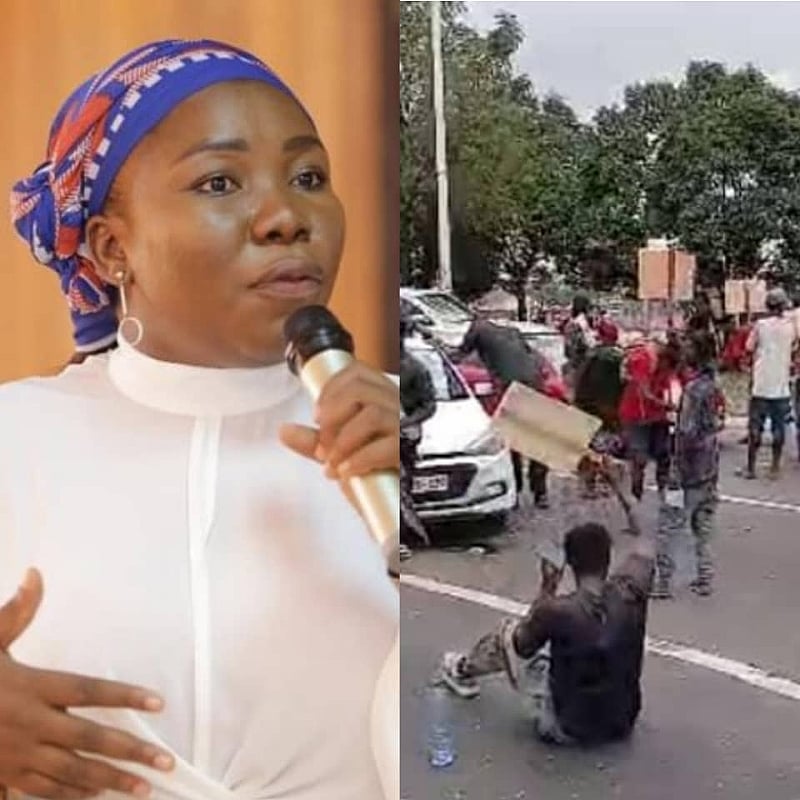Minister of Information Fatimatu Abubakar recently voiced her strong criticism of the Democracy Hub protesters, who engaged in disruptive actions during a three-day demonstration against illegal mining, commonly referred to as galamsey. The protest took place near the 37 Military Hospital, where participants blocked roads, set fires, and played football in the streets, thereby obstructing public peace. The situation intensified when the protesters, under the leadership of Oliver Barker-Vormawor, prevented access to the hospital and surrounding areas for commuters. Concern escalated when Barker-Vormawor reportedly removed the keys from a police vehicle and threw them away, necessitating police intervention. Over 50 protesters were subsequently arrested, taken to court, and remanded in custody.
Abubakar articulated her views on the protest during an appearance on Peace FM’s ‘Kokrokoo’ morning show, denouncing the demonstrators’ behavior as unconstitutional and reckless. She emphasized that the exercise of one’s rights to protest must not infringe upon the rights of others, stating, “In pursuing your right, remember that where your right ends is where somebody else’s begins.” This sentiment highlights the delicate balance needed when exercising freedoms in a public space. The Minister’s message was a firm reminder that the freedoms of assembly and expression do not absolve individuals from the necessity to respect the rights and needs of fellow citizens.
Furthermore, Fatimatu Abubakar criticized the protesters for inciting unrest without comprehending the potential repercussions of their actions. Drawing comparisons to troubled nations like Rwanda and Mali, she warned of the destructive consequences of conflict, suggesting that many protestors might be underestimating the fragility of peace in their own country. “We’re downplaying our peace and calling for war, thinking we’re prepared to fight,” she contended, underlining a lack of awareness regarding the long-lasting trauma and instability that often follow violent conflict situations. Her remarks serve as a cautionary statement against the naive glorification of protests that might lead to widespread turmoil.
Abubakar stressed the importance of prioritizing the collective welfare of the nation over individual agendas, appealing particularly to Ghanaian youth. She urged them to focus on the interests of the nation and work towards a unified goal, advocating for a sense of responsibility that promotes Ghana’s well-being. “It is our duty to pursue the interests of Ghana first before our individual interests,” she declared. This call to action resonates deeply, especially in a time where civil engagement can often devolve into self-serving acts that disrupt societal harmony.
Additionally, the Minister expressed her appreciation for the police’s restraint during the protests, acknowledging their commitment to maintaining order in a challenging situation. “I’m glad the police did not resort to violence. They had guns, clubs, and shields, but they didn’t hit anybody,” she remarked, highlighting the professionalism and composure exhibited by law enforcement amid provocative circumstances. This commendation reinforces the idea that effective policing does not require aggression, but rather relies on self-control and de-escalation tactics in managing public demonstrations.
In conclusion, Fatimatu Abubakar’s analysis of the Democracy Hub protests underscores the complex interplay between individual rights and collective responsibilities. Her strong condemnation of the protesters’ methods and her evocative comparisons to regions plagued by instability serve as a reminder of the potential costs of civil unrest. By urging unity and a collective focus on national interests, she not only reinforces the value of peaceful discourse but also champions the need for a mature understanding of civic actions within the context of Ghana’s ongoing democratic fabric. The Minister’s stance emphasizes the critical role of responsibility in advocacy, underscoring the notion that true progress may be achieved through peace, understanding, and dialogue rather than through divisive actions or disruptions.


